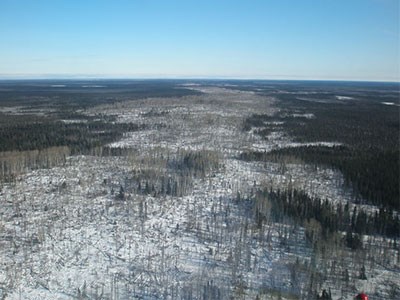Cliffs Natural Resources has been dealt a blow in gaining transportation access to its Ring of Fire chromite projects.
Ontario's Mining and Lands Commissioner ruled against the Ohio miner, which had been seeking a road easement to cross the mining claims of its bitter rival, KWG Resources, in order to build an ore haul road out of its deposits in the James Bay region.
In a ruling released Sept. 10, the tribunal ruled that granting an easement to Cliffs would interfere with KWG-Canada Chrome's ability to work its claims since “numerous heavy trucks (passing) every day” would cover up future drilling and sampling sites.
In an act of foresight back in 2009, KWG began staking a long ribbon of mining claims for a future railroad from its isolated Big Daddy chromite deposit heading south for 328 kilometres to a point on the Canadian National Railway's (CN) main cross-Canada line, just west of the village of Nakina in northwestern Ontario.
A good portion of that route was atop a sandy ridge or glacial esker, easily the best spot in the muskeg country of the James Bay lowlands. KWG formed a subsidiary, Canada Chrome, to oversee this railroad venture.
At one time, KWG and Cliffs were development partners, but after a falling out Cliffs went about seeking to secure its own transportation corridor. But the best route belonged to KWG and when Cliffs approached the Toronto junior miner for access, it was refused and the matter ended up in the Mining Commissioner's lap last year.
The tribunal ruled there is little room on the sand ridge for the two mining companies to use the same route. Cliffs' proposed road “touches each of the claims (of KWG-Canada Chrome) in some part” and there was little indication the ridge could support two heavy ore-haul transportation systems.
Bill Boor, Cliffs' senior vice-president of global ferroalloys, who had testified before the tribunal, was not made available for comment.
A spokeswoman for Cliffs called the commissioner's decision “disappointing.”
In an emailed statement, Jennifer Mihalcin said maintaining a north-south permament road is “essential” to the development of its chromite project.
The company did not say whether it is appealing the commissioner's decision to a higher court.
“We are still considering all of our options,” said Mihalcin.
Cliffs' Black Thor-Black Label chromite projects are in development limbo since the company announced in June it was stopping all environmental assessment work until issues with area First Nations and the Ontario government were resolved.
The company maintains its road would provide “significant economic benefits” for remote First Nation companies and resource companies operating in the Far North.
“We will continue to work with the province, First Nations, and other companies in the hope that we can overcome this roadblock and develop what will ultimately be important infrastructure to the Ring of Fire,” said Mihalcin.




